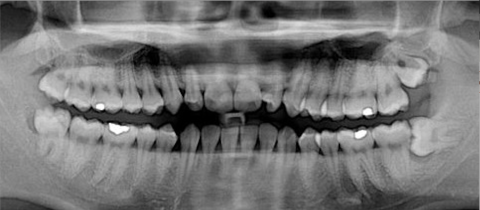What does the appendix even do? When we think about this little finger-shaped pouch hanging off of our digestive tract, it’s often as a ticking time bomb. Every year, a little over 40,000 Canadians develop appendicitis, a life-threatening inflammation of the appendix. Once the little bugger is removed, we are told our health won’t change. The appendix after all is a vestigial organ, a useless fossil in our abdomen.
The last twenty years of research, however, have changed our perspective on this tiny organ. It may not be worthless after all.
It’s been hypothesized to be a safe house.
A vestigial bomb
Your appendix, if you still have it, is most probably on the right side of your body, well below the belly button. In rare cases, people are born without it, or they are born with two, or it’s on the left side of their body, or it is strangely shaped like a horseshoe. No increase in luck guaranteed.
In humans, it can also be called the vermiform appendix, meaning that it is (typically) in the shape of a worm. In adults, it has an average length of 9 cm (3.5 inches). It exists at the junction between your small intestine and your colon, like a little worm sticking out of your gut.
For a very long time, it was thought to be vestigial, a leftover from when our primate ancestors ate leaves. It was a particularly cruel leftover because of its propensity to become inflamed and burst. In your lifetime, the chances of you developing appendicitis are between 6.7 and 8.6% (to do a crude conversion, somewhere between 1 in 10 and 1 in 20). A common cause of appendicitis is an obstruction. A calcified fecal deposit (we are in the gut, after all) can plug up the appendix, which leads to a pressure build-up. Blood and lymph can’t drain properly from the appendix and it can die, with bacteria making a meal of it. Eventually, it can rupture and leak its content into the abdomen, creating inflammation, sepsis, and potentially death. The most popular way of avoiding these complications is to surgically remove the organ when it is inflamed, although research has provided evidence for the benefits of a course of antibiotics as an alternative in some cases.
Appendicitis is a well-known medical problem, but you may be surprised to learn that your appendix can, in rare cases, become cancerous. This type of cancer can be aggressive but its incidence is thankfully quite low, a few cases per million people every year.
All of this downside and no benefit? It might be tempting to argue that everyone should have their appendix surgically removed just in case, but of course cutting people open is not a risk-free procedure.
Besides, our appendix just may have a role to play in our immune system.
A safe house in our gut
Based on converging observations, it has been hypothesized that our appendix may serve as a safe house for good bacteria. We have known for some time that bacteria exist in our gut and that they fulfill an important role. This gut microbiome is an important object of research, though commonly overhyped. The bacteria lining up our colon thus need to be there but what happens when you get severe diarrhea? You lose a lot of them. How do you replenish them quickly?
The idea is that the appendix, which is known to host bacteria, would serve as a back-up. Following diarrhea, its bacterial content would recolonize the colon to bring the ill person back to normal. In an industrialized country with proper sewage and clean drinking water, this is a minor issue, but pre-industrialization, it would have been particularly beneficial.
That’s the theory, anyway. It would make sense for the appendix to have or have had some sort of function, as it independently evolved in many species over time. We have also learned that the appendix contains immune tissue particularly important in early life. We also know that the bacteria living in the appendix are quite diverse, and that its dominant types are the same as those in the colon. Beyond that, scientists are speculating. As a recent summary of the evidence put it, the idea that our appendix is a safe house for good bacteria to reseed the gut is “logical but largely theoretical.”
The appendix does appear to be an immune organ and its function may extend to inflammatory bowel disease. Ulcerative colitis, for example, is a condition characterized by episodes of inflammation of the colon and rectum. Some studies point a finger—a very appendix-shaped finger—at the appendix itself as a risk factor. Having your appendix removed before the age of 20 is associated with a lower risk of developing ulcerative colitis. And in people who do get ulcerative colitis after having their appendix taken out, the chances they will have to undergo a surgical removal of their colon appear to be lower. Researchers have even conducted studies in which patients with the disease and who do not respond to treatment agree to have their appendix removed, but studies are contradictory so far on whether or not this is beneficial.
More research, as always, is sorely needed, but don’t be surprised if you keep hearing the word “appendix” in future discussions of our immune system and of diseases that affect our gut.
A recent Medscape article on the potential value of the appendix led me to a 1928 editorial by Dr. Miles J. Breuer, who was both a physician and a science fiction writer. At the time, he wondered about balancing the needs of the individual with the needs of the species, writing that Nature was attempting to get rid of the appendix. A long and well-developed appendix was thought to be a particularly likely time bomb. Through this crude lens (which Breuer did not share in this editorial, to be fair), the people dying of appendicitis were simply victims of a useful cleansing process. Their deaths would strengthen “the human stock” by removing from it the people with long appendices prone to inflammation. What of the doctor trying to remove the appendix in time and save its human host? “The surgeon who is rescuing the individual,” Breuer wrote, “has succeeded in deteriorating the race.” He was giving voice to a eugenics-driven view of the human race, common at the time, before counterarguing that there is actually great value in reducing human suffering.
From a relic that makes its owner inferior to an active player in our microbiome, the appendix has had quite the rehabilitation. It is both incredible and heartening to see how much our thinking has evolved over the centuries.
Take-home message:
- The appendix is a short pouch hanging off of our digestive tract, long thought to be a useless remnant from when our ancestors ate leaves
- It has recently been hypothesized that it serves as a safe house for bacteria to recolonize the colon following diarrhea, which would have been very useful especially before the widespread availability of clean drinking water
- The removal of the appendix at a young age seems to reduce the risk of developing a type of inflammatory disease of the colon and rectum







